Wednesday, October 18, 2023. Annette’s News Roundup.
I think the Roundup makes people feel not so alone.
To read an article excerpted in this Roundup, click on its blue title. Each “blue” article is hyperlinked so you can read the whole article.
Please feel free to share.
Invite at least one other person to subscribe today! https://buttondown.email/AnnettesNewsRoundup
________________________________
The Israeli-Hamas War.
Again, war is hell.
Israel and Hamas each blamed the other side for the blast which killed hundreds of people in a hospital in Gaza. Hamas blamed an Israeli airstrike, while the Israeli military [the IDF] said the hospital was hit by a rocket misfired by Palestinian militants [Palestinian Islamic Jihad].
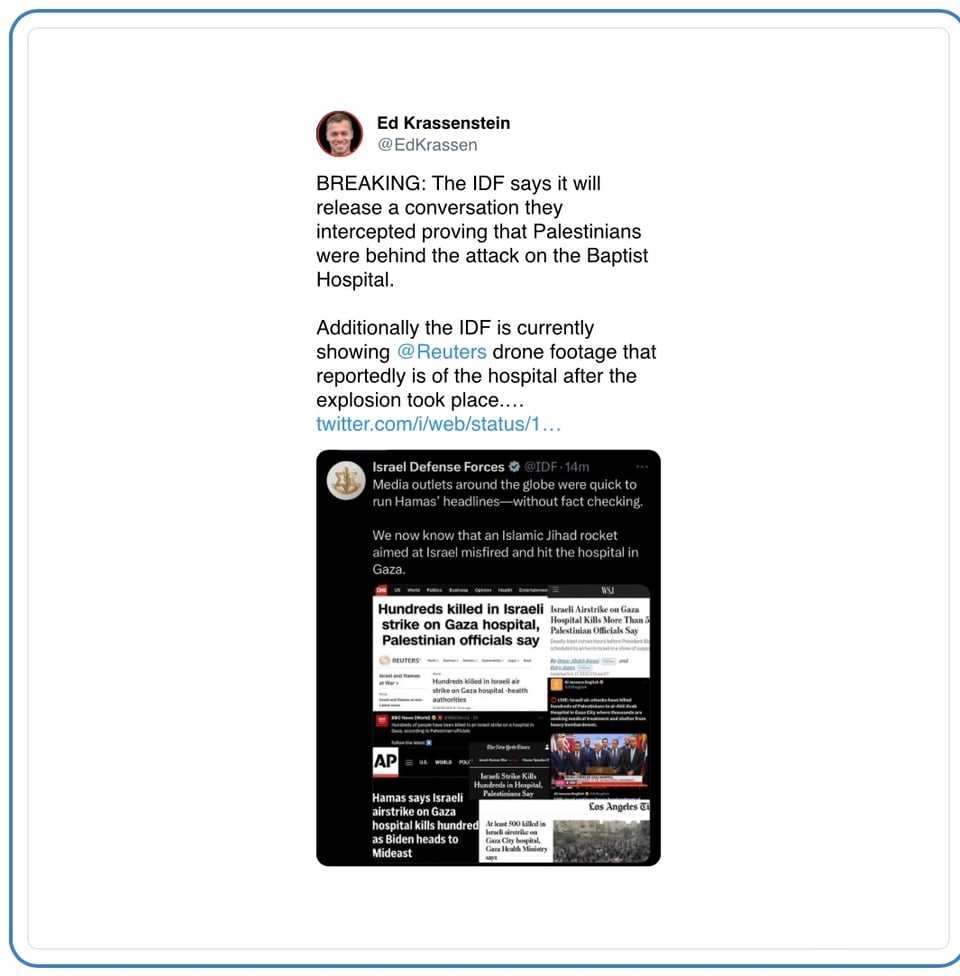
While in the air, Biden released a statement saying he was “outraged and deeply saddened by the explosion at the Al Ahli Arab hospital in Gaza, and the terrible loss of life that resulted.”
He said he spoke “immediately” after hearing the news with King Abdullah II of Jordan and Israeli Prime Minister Netanyahu and said he has “directed my national security team to continue gathering information about what exactly happened.”
“The United States stands unequivocally for the protection of civilian life during conflict and we mourn the patients, medical staff and other innocents killed or wounded in this tragedy,” Biden added. (Associated Press).
Today @SecBlinken announced that the U.S. and Israel have agreed to develop a plan that will enable humanitarian aid from donor nations and multilateral organizations to reach civilians in Gaza, including the possibility of creating areas to help keep civilians out of harm's way. pic.twitter.com/6OKf1ZxuXj
— Department of State (@StateDept) October 17, 2023
________________________________
One round down. 14 or more to go?
Gym Jordan had 20 defectors yesterday. House Republicans are a mess.
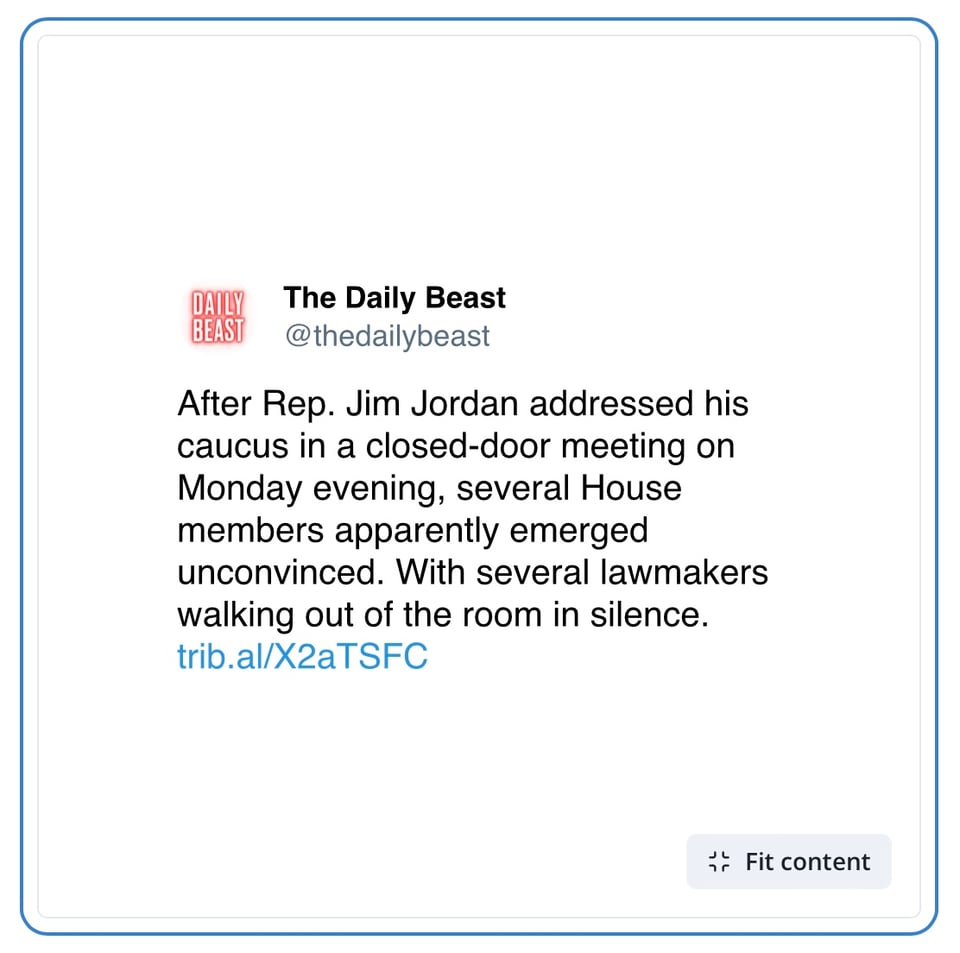
"He has not been a good chairman of the Judiciary Committee, and he has not been a good member of congress. He was up to his eyeballs in the plot to overturn the constitution... " @RepZoeLofgren w/ @NicolleDWallace on Jim Jordan's track record as a member of congress. pic.twitter.com/uNNCiCnaVT
— Deadline White House (@DeadlineWH) October 17, 2023
From a former Republican Speaker of the House.
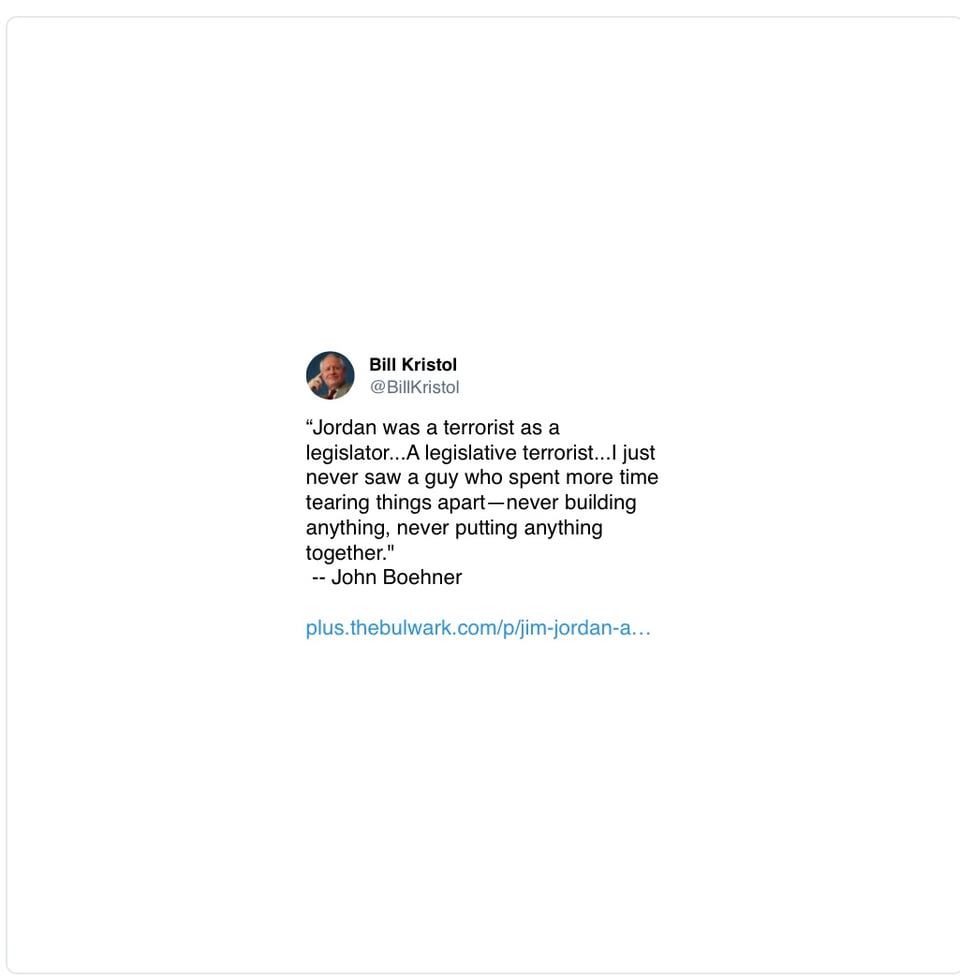
Matthew Dowd was the chief strategist for the Bush–Cheney 2004 presidential campaign.
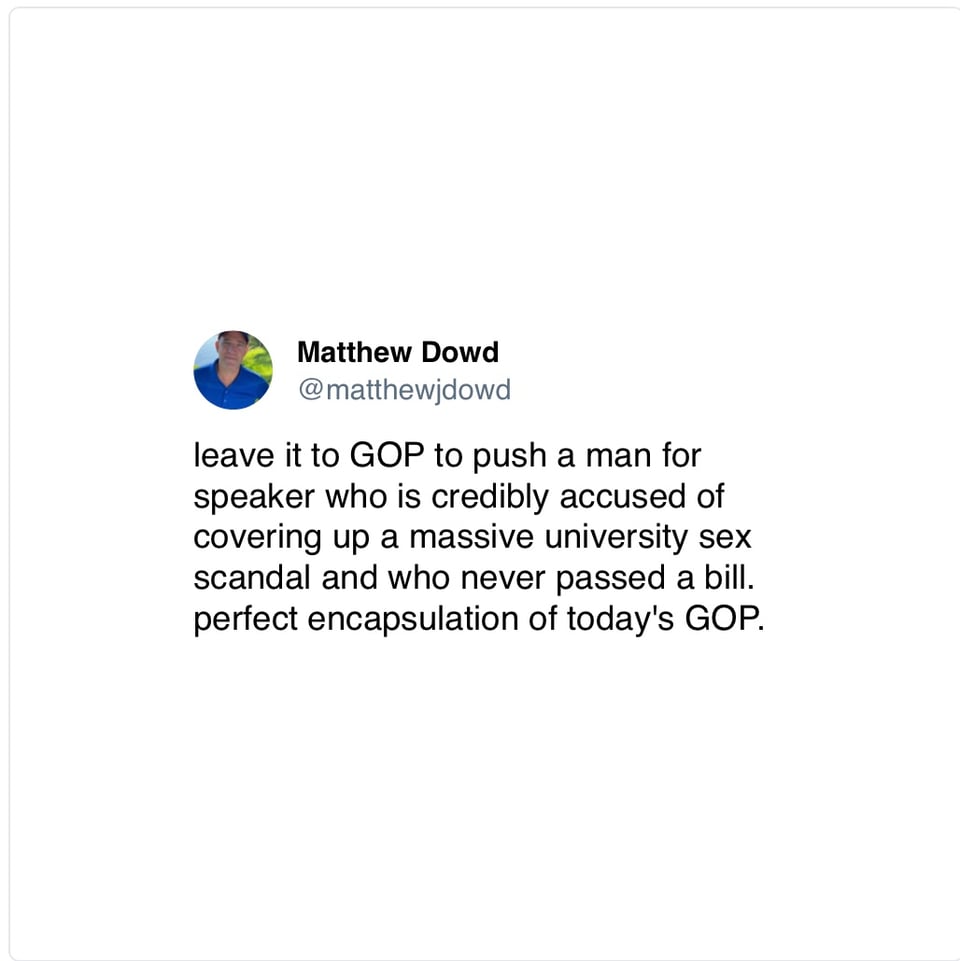
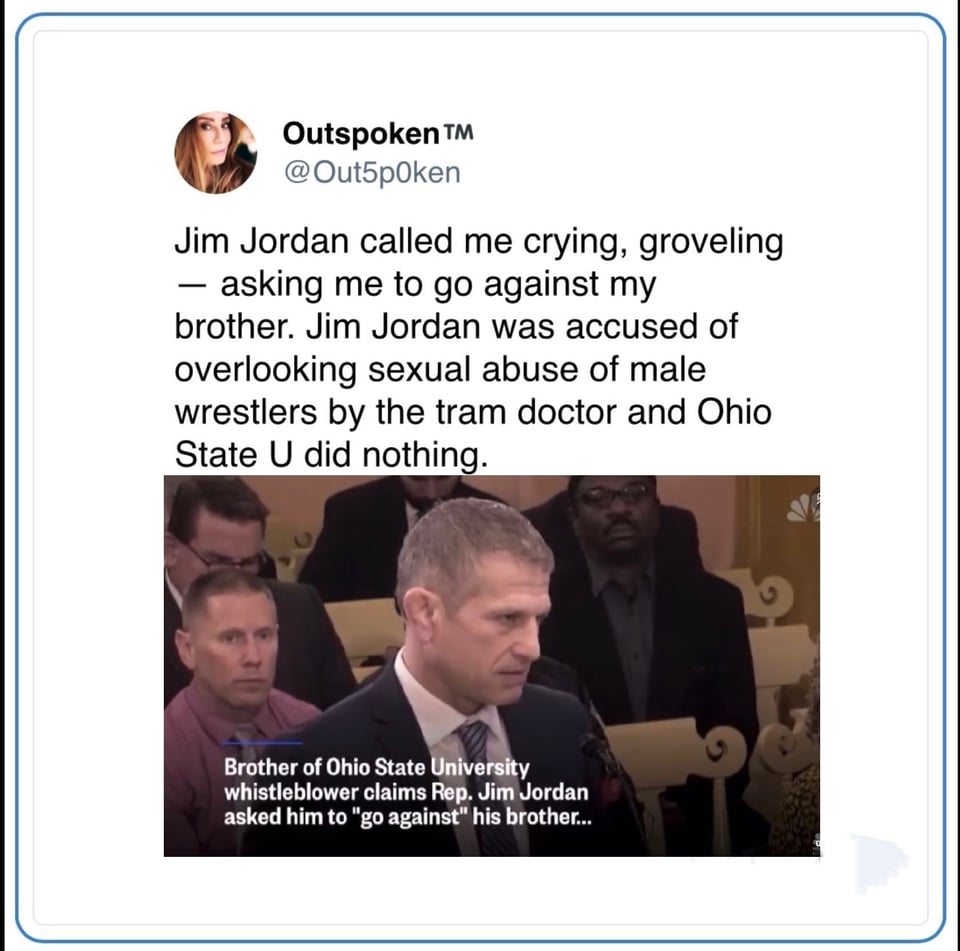
________________________________
Healthcare is a Social Justice issue. October is Breast Cancer Awareness Month.
Will we finally make some progress for Black women?
Breast cancer is deadlier for Black Women. A study of mammograms could help close the gap.
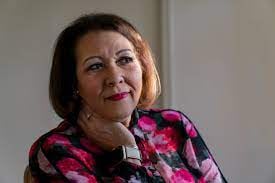
Are 3D mammograms better than standard 2D imaging for catching advanced cancers?
A clinical trial is recruiting thousands of volunteers — including a large number of Black women who face disparities in breast cancer death rates — to try to find out.
People like Carole Stovall, a psychologist in Washington, D.C., have signed up for the study to help answer the question.
“We all need a mammogram anyway, so why not do it with a study that allows the scientists to understand more and move closer to finding better treatments and ways of maybe even preventing it?” Stovall said.
The underrepresentation of women and minorities in research is a long-simmering issue affecting health problems including Alzheimer’s disease, stroke and COVID-19. Trials without diversity lead to gaps in understanding of how new treatments work for all people.
“Until we get more Black women into clinical trials, we can’t change the science. And we need better science for Black bodies,” said Ricki Fairley, a breast cancer survivor and advocate who is working on the issue.
Black women are 40% more likely to die from breast cancer than white women and tend to be diagnosed younger. But it’s not clear whether 3D mammography is better for them, said Dr. Worta McCaskill-Stevens of the National Cancer Institute.
“Are there populations for whom this might be important to have early diagnosis?”asked McCaskill-Stevens. “Or is it harmful,” causing too many false alarms or unneeded follow-up tests and treatments?
McCaskill-Stevens, who is Black, leads NCI’s efforts to boost access to cancer research in minority and rural communities. She has joined the study herself.
The newer 3D technique has been around for a decade, but there’s never been conclusive evidence that it’s better than 2D at detecting advanced cancers. The screening technique combines multiple pictures of the breast taken from different angles to create a 3D-like image. Both 3D and 2D mammograms compress the breast and use low doses of radiation.
Prior studies suggest that 3D finds more cancers than 2D, but catching more cancers doesn’t necessarily mean more lives saved. Some cancers missed by standard screening may not progress or need treatment. Previous studies did not randomly assign patients to a screening method, the gold standard for research.
The notion “that if it’s new, it’s shiny, then it’s better,” isn’t necessarily true, McCaskill-Stevens said. “Until we have the evidence to support that, then we need well-designed randomized trials.”
The trial has enrolled nearly 93,000 women so far with a goal of 128,000. The NCI-funded study is now running in Canada, South Korea, Peru, Argentina, Italy and 32 U.S. states. A site in Thailand will soon begin enrolling patients.
“We added more international sites to enhance the trial’s diversity, particularly for Hispanic and Asian women,” said Dr. Etta Pisano, who leads the study.
Overall, 42% of participants are Hispanic. As recruiting continues, enrolling Black women and other women of color will “absolutely” continue as a priority, Pisano said.
Participants are randomly assigned to either 2D or 3D mammograms and are followed for several years. The number of advanced cancers detected by the two methods will be compared.
At the U.S. study sites, 21% of study participants are Black women — that’s higher than a typical cancer treatment study, in which 9% of participants are Black, McCaskill-Stevens said.
The University of North Carolina has signed up more Black women than any other study site. Nearly a quarter of the nearly 3,000 women enrolled at UNC’s two locations are Black.
“Women in North Carolina want to take part in something that’s bigger than them,” said Dr. Cherie Kuzmiak, who leads the UNC arm of the study. “They want this active role in helping determine the future of health care for women.”
In Washington, D.C., word of mouth has led to successful recruiting.
A chance encounter at her hair salon persuaded Stovall to join the research. While waiting for a hair appointment, she met Georgetown University cancer researcher Lucile Adams-Campbell. The two, both Black, started chatting.
“She explained how important it was to get women of color into the program,” said Stovall, who jumped at the chance to catch up on her mammograms after the COVID-19 pandemic delayed screening for her and thousands of others.
For Stovall, there was a personal reason to join the research. Her sister recently completed treatment for triple negative breast cancer, an aggressive type that affects Black women at higher rates than white women.
Women ages 45 to 74 without a personal history of breast cancer are eligible for the study, which launched in 2017. Many women also are providing blood and cheek swab samples for a database that will be mined for insights.
“It’s a dream that people had since the beginning of screening that we wouldn’t fit everybody into the same box,” Pisano said. The study’s findings could “reduce disparities if we’re successful, assuming people have access to care.”
Stovall, 72, had a brief scare when her mammogram, the traditional 2D type, showed something suspicious. A biopsy ruled out cancer.
“I was extremely relieved,” Stovall said. “Everybody I know has heard from me about the need for them to go get a mammogram.” (Associated Press).
________________________________
Do you know this rabbi? Did you hear (or read) her sermon on the Israeli-Hamas War?
Rabbi Angela Warnick Buchdahl is senior rabbi of Central Synagogue in New York City. She was the first Asian American to be ordained as a rabbi in North America, and before that the first ordained as a cantor.
‘There are no words’: When what’s not said is what hurts the most, by Rabbi Angela Warnick Buchdahl of Central Synagogue, New York City.
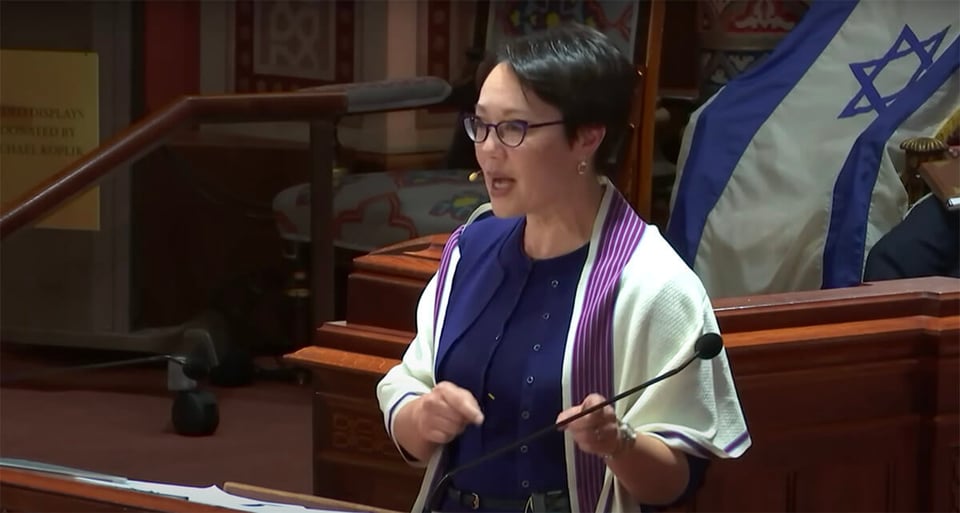
This essay was adapted from a sermon given Friday, Oct. 13 at Central Synagogue in Manhattan. Watch the full sermon.
Ein milim, ein milim — there are no words. This is what I hear over and over from Israeli family and friends since the largest, most vicious massacre of Jews since the Holocaust.
Ein milim. How can mere words describe the barbarism of hundreds of Hamas terrorists streaming into Israel with no other purpose than to hunt down and murder Jews — in their homes, at bus stops, at a music festival — while gleefully livestreaming their rampage to exultant crowds?
What words can you say to a father witnessing a video of his 20-year-old daughter, petrified, screaming, as Hamas terrorists motor her off into the abyss.
What words can convey the horror of Hamas terrorists storming into “safe rooms,” slaughtering parents before their children’s eyes, and then dragging those children down into the tunnels below the Gaza Strip?
Hamas terrorists seized elderly Holocaust survivors, set people on fire, and murdered babies. There is no depraved act you could possibly imagine that they did not do. There are no words.
As this murderous rampage unfurled on Shabbat, Jews around Israel, not yet knowing exactly what was happening, unfurled the Torah for the holiday of Simchat Torah.
They read the last chapter, which describes the death of Moses, and then the first, the story of creation. In a cosmic, haunting echo of what was going on around our Israeli family, the Torah cycle moved from Deuteronomy, whose Hebrew name Devarim literally means “words,” to a world that was tohu vavohu – ”formless and void, with darkness over the face of the deep.”
Israel, and the Jewish world, passed from words to no words.
But then, in the creation story, God said: “Let there be light” and there was light. God creates light – creates the entire world – with words.
As a Jewish people, we understand the power of words to create reality. Words bolster nations, build bridges, and bring healing. But words can also become barriers, curses and weapons.
Jews have never ascribed to the childhood rhyme that “words will never hurt us.” We know how very potent they are. And we also know how silence – the absence of words – can enable evil and chaos.
As I sat heartsick and devastated by the deadly violence in Israel, I was shocked by the words that kept appearing in response. Words like “resistance,” “decolonizing” and “freedom fighters” that valorized and celebrated Hamas terrorism. Words that, perversely, found a way to blame Israel for these monstrous attacks.
Equally upsetting were the muted or ethically opaque statements from the people we look to for moral leadership.
University presidents somehow could not bring themselves to state clearly the simple truths of these attacks: That the perpetrators were terrorists, and their victims were Jews.
I belong to an interfaith group representing most of the major churches, synagogues and mosques in New York. This week, leaders in that group attempted to issue a statement in response to the Hamas attack. But their draft was limited to platitudes. We stand in solidarity with the people of the region. We call to stop the violence in the Holy Land.
The leaders of our faith community could not just say the words: We condemn Hamas terrorism and this massacre. After some back and forth, the group never issued a statement at all.
Another interfaith group seeking to raise money for the region wrote an email decrying the “cycle of violence” and “intergenerational trauma.” I cringed. This heinous attack was not just part of a “cycle of violence.” Intergenerational trauma can never justify the mass murder and abduction of civilians.
These academics and faith leaders have made careers out of words, and they know their power. But we saw them choose words that made false equivalencies, blamed the Jewish victims, and implied moral ambiguity where there was none.
It is chilling to realize how many people – people who generally have the most compassion for victims of oppression and violence — simply have a blind spot when those victims are Jews.
Never before have I felt how important words are for creating realities. And how deafening silence can feel in the face of an atrocity.
When I heard President Joe Biden deliver his emotional, unequivocal condemnation of Hamas as a terrorist organization akin to ISIS; when he named the atrocities as unadulterated evil, and clearly affirmed, “We stand with Israel.” I started crying.
I didn’t even realize how much I needed to hear our president say the words.
And because words are so powerful, let’s take care to use the right ones.
Do not equate Hamas with the Palestinian people. Conflating these Hamas attacks with “Palestinian resistance” is an insult to the many Palestinians who abhor Hamas. When it comes to these attacks, say the words: terrorism, mass murder, crimes against humanity.
And we must not let our enemies use words to stigmatize Israelis. They are not colonialists —Jewish history and sovereignty on that land goes back millenia. Most modern Israelis are Jewish refugees from the Middle East, Europe, Africa and around the world who have returned to the only Jewish home we have.
The Jews of Israel are nothing like the French colonials in Algeria, or the British in India, who could leave and go home to France or England. Israeli Jews can’t go back to any country. Israel is their country — and as Jews, Israel is our country.
In the beginning, when God created light, God separated the light from the dark. Today, as Israel is forced to forge a new bereshit — a new world for Israel – for make no mistake, it will never be the same – the light was separated from the dark — there is no gray area here.
The world saw what pure evil looks like. Evil is the barbaric massacre that Hamas carried out on Israeli soil. Evil is Hamas using billions of dollars of aid not to build schools and infrastructure to uplift Gazans, But to build a militia and tunnels to kill Israelis. Evil is Hamas breaking all international laws of warfare and embedding themselves in civilian areas wearing civilian clothes, because the death of innocent Gazans is a strategic tactic of their jihad.
Israel has a moral imperative to protect its citizens and to rescue its hostages. Vanquishing Hamas, whose charter purpose is to exterminate Israel, is a just and moral war. One we didn’t choose, but now can’t avoid.
Amid the darkness, we’ve also seen glimmers of light: Landmarks in Berlin, Paris, London and our own White House lit up in blue and white. The democracy movement in Israel morphing overnight into a network of social services for displaced families and the wounded.
Reservists, who the week before refused to serve in protest of the government, now showing up at over 100%. And the American Jewish community, so often divided on Israel, feeling the pain of their sisters and brothers and responding with a generous outpouring of support.
Ein Milim. There are no words. But in the absence of words, we turn to each other, and to the prayers of our people that have given us language when we cannot find our own.
We turn to Israel’s national anthem, Hatikvah —The Hope — whose words have enabled our people to survive the unimaginable, and to create anew.
________________________________
So far 4 of 9 Justices support ethics reform at the Supreme Court.
Justice Amy Coney Barrett supports Supreme Court ethics code.
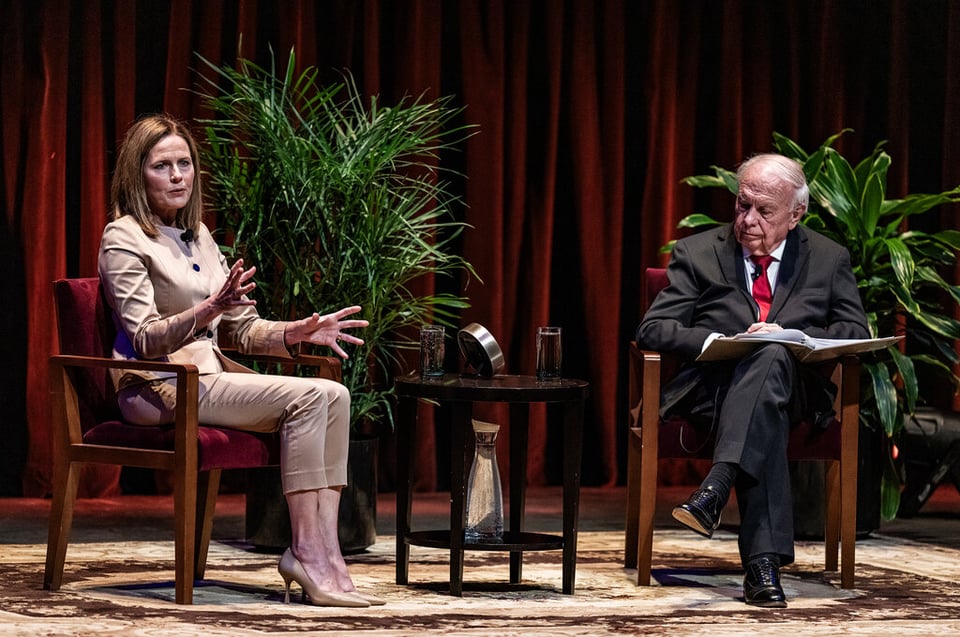
Justice Amy Coney Barrett spoke on Monday at the University of Minnesota Law School with Robert Stein, law professor and the former chief operating officer of the American Bar Association.
Justice Amy Coney Barrett spoke in favor of a U.S. Supreme Court ethics code during a University of Minnesota Law School event on Monday, per multiplereports.
Why it matters: The Supreme Court is the only court in the federal judiciary that doesn't have an official ethics code and there have been growing calls for it to adopt one following revelations of lavish gifts and business activities of some of the justices.
What she's saying: "It would be a good idea for us to do it," Barrett said during a conversation with Robert Stein, a longtime law professor and the former chief operating officer of the American Bar Association, at the Minneapolis event, according to the New York Times.
"Particularly so that we can communicate to the public exactly what it is that we are doing in a clearer way," added the conservative justice, whose talk was briefly interrupted by demonstrators protesting the highest U.S. court's decision to overturn Roe v. Wade and end federal protections on abortion.
Barrett noted the justices broadly back ethical guidelines like those followed by lower courts, NBC News reports.
"There is no lack of consensus among the justices," she said. "There's unanimity among all nine justices that we should and do hold ourselves to the highest ethical standards possible."
Of note: Justice Elena Kagan has voiced her support for an ethics code and Justice Brett Kavanaugh has said he's "hopeful that there will be some concrete steps taken soon" in the matter.
The big picture: The Senate held a hearing into the Supreme Court's ethical standards in April as Democrats pushed for an investigation into justices' activities following reports of lavish gifts and business activities concerning Justices Clarence Thomas and Neil Gorsuch.
Go deeper: Roberts says he's "committed" to highest standards for Supreme Court
________________________________
New Law Clinic at Rutgers will honor Ruth Bader Ginsburg’s name and values.
Record-Breaking Donation Will Establish New Rutgers Law Clinic.
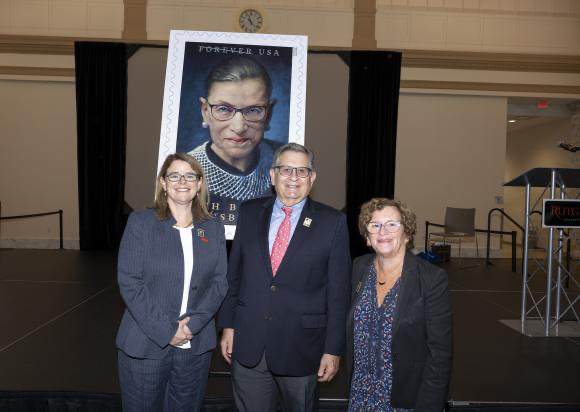
The Stephanie and Harold Krieger Charitable Trust has gifted $6.5 million to Rutgers Law School, the second largest gift in the law school’s history. Of the donation, $5.5 million will be used to establish the new Ruth Bader Ginsburg Women’s Rights and Gender Justice Clinic.
Rutgers Law School Dean Johanna Bond said, “This gift will re-establish and expand the former Women’s Rights Litigation Clinic, which the Justice founded here in the early 1970s and which accomplished groundbreaking law reform until it ceased operation in the early 2000s.”
The clinic’s mission will be to advance gender equity through direct representation, impact litigation, and legislative work; educate a new generation of students to continue the fight for gender equity; and expand the reach of Rutgers’ nationally ranked clinical programs with a distinct women’s and gender rights clinic.
The gift also creates The Stephanie and Harold Krieger Memorial Endowed Scholarship with a $1 million endowment. This will provide major scholarships for three law students in Newark. Preference will be given to first-generation college students in good academic standing with demonstrated financial need.
Harold Kreiger graduated from New Jersey Law School, the predecessor of Rutgers Law, in 1929. He had an active practice that spanned labor law, workers compensation, criminal law, and municipal law. During his lengthy career of private and public practice in Jersey City, he served as municipal judge, assistant corporation counsel, counsel to the Redevelopment Agency and the Parking Authority, and Hudson County counsel. In later years, he served as commissioner of the Tri-State Regional Planning Commission.
Kreiger’s will provided that upon the passing of his wife, Stephanie, a charitable trust would be created and directed by the named trustee, Brett S. Harwood, a longtime family friend. Before Stephanie’s passing, Harwood received her full endorsement of the new clinic’s funding and scholarship fund.
“The fight goes on. The legacy goes on,” Harwood stated. “We’re creating the funds to create a long lasting legacy to Ruth Bader Ginsburg, and it pleases me very, very much to be able to facilitate this.”
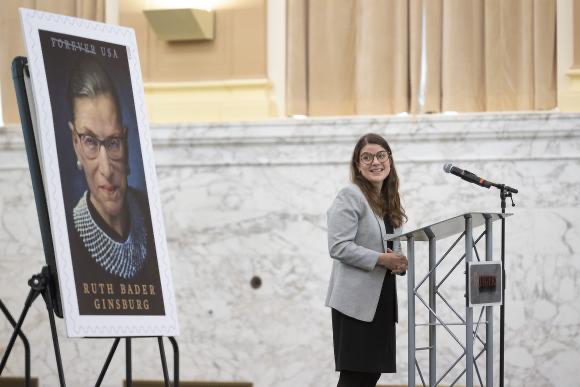
Justice Ginsburg’s granddaughter Clara Spera.
Dean Bond announced the gift at a formal unveiling of the U.S. Postal Service’s Ruth Bader Ginsburg stamp. The celebration took place on October 16 at Ruth Bader Ginsburg Hall on Rutgers-Newark’s campus. Nearly 200 people attended the unveiling, including students from Barringer, Central, and University high schools in Newark. Justice Ginsburg’s granddaughter Clara Spera, a lecturer at Harvard Law School, gave remarks at the celebration.
“This stamp is an especially meaningful tribute to my grandmother for many reasons,” Spera said. “She joins the ranks of other justices she revered, like Thurgood Marshall, and other path-marking civil rights advocates like Ella Baker and women’s rights pioneers like Lucretia Mott and Elizabeth Cady Stanton.”
The event was co-sponsored by the U.S. Postal Service; the Ebony Society of Philatelic Events and Reflections, which commemorates stamps related to the African Diaspora; and the American Association of University Women’s New Jersey Chapter. Rutgers-Newark was also a sponsor.
Ruth Bader Ginsburg Hall, built in 1929, was named in her honor in 2020. The neoclassical skyscraper was home to the law school from 1975 to 1999 and now features a residential facility for students and event space.
Rutgers-Newark Chancellor Nancy Cantor said, “Standing here, in a building named for our beloved Justice Ginsburg, on a campus where she herself found inspiration, I find inspiration, too; to keep fighting for justice with our faculty, our staff, our students who are incredibly inspiring in their own right.”
A revered champion of civil rights, Justice Ginsburg served on the Supreme Court from 1993 until her death in 2020. During her time on the court, she issued many opinions that advanced equal rights for women and credited her time at Rutgers Law as inspiration for her work. She taught at Rutgers Law School in Newark from 1963 to 1972, becoming one of only two women law professors at Rutgers and one of just a handful in the nation. She led a seminar on women and the law and served as the founding faculty adviser for The Women’s Rights Law Reporter (WRLR). The journal is now the oldest legal periodical in the U.S. focusing exclusively on the field of women’s rights law. Elizabeth Langer ‘73, who co-founded WRLR and served as its first editor-in chief, gave a brief history of the journal’s origins at the celebration.
“She {Ginsburg} was our teacher, our role model, and our anchor during a time when we needed support,” Langer said. “She gave us strength to pursue a mission: making the world a better place by serving those who have been marginalized.”
Langer mentioned that female enrollment was at 20% when she entered Rutgers Law School in 1970, which was unusually high for a U.S. law school. Fifty-three years later, Rutgers Law has the highest enrollment of women in the law school’s history at 59%. (Law.RUtgers.edu)
________________________________
And this happened yesterday too.
Senator Minority Leader McConnell threatened that he wouldn’t seat someone appointed to the Dianne Feinstein’s seat on the Judiciary Committee if she resigned. That would have stopped the President’s Judicial appointments.
Happily he did not continue with that pledge now that Laphonza Butler was appointed by California Governor Gavin Newsom after Senator Feinstein’s death.
With Senator Butler on the Committee, President Biden’s judicial appointments will move forward.
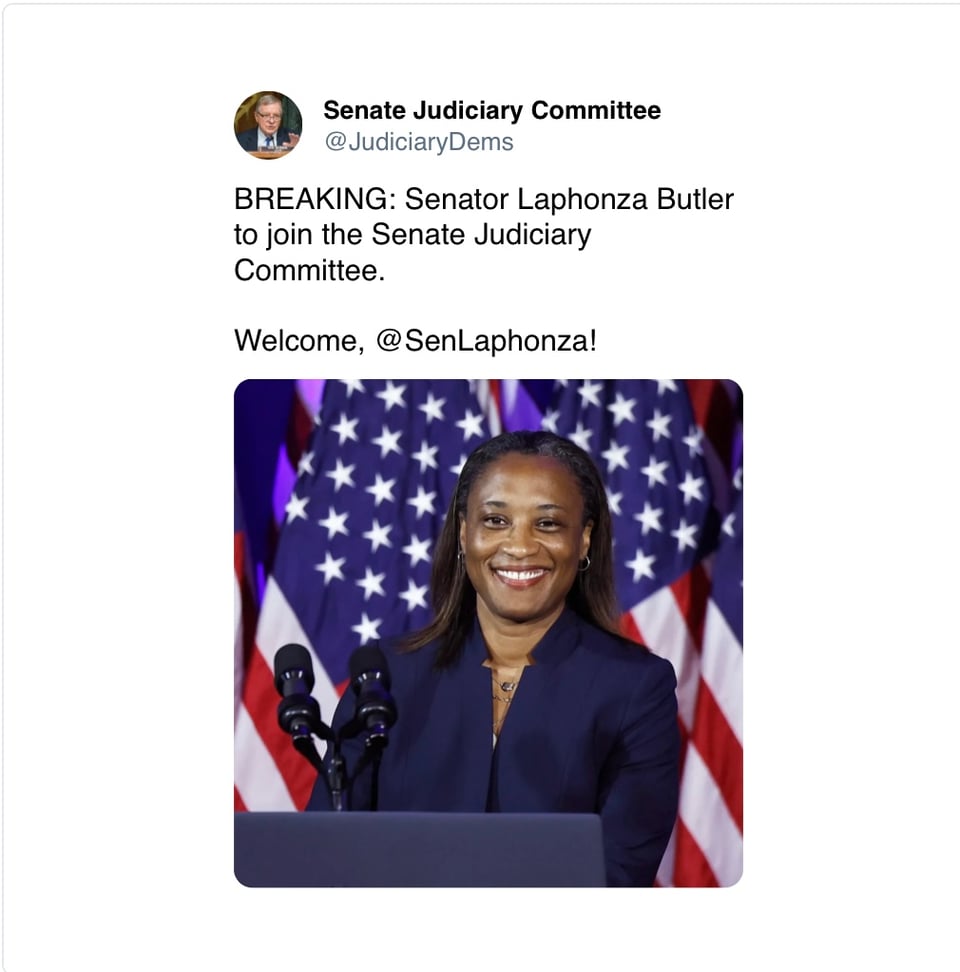
________________________________